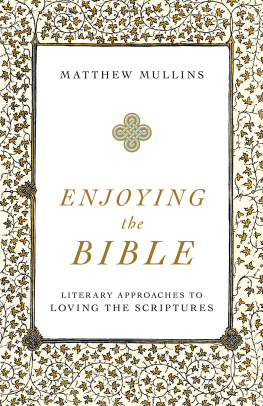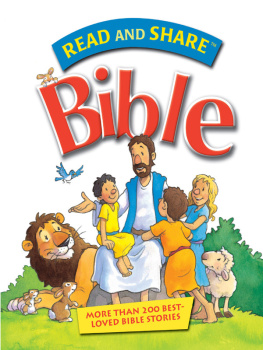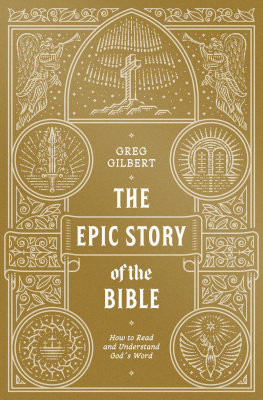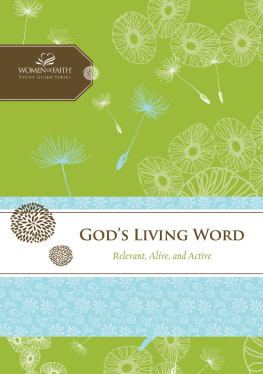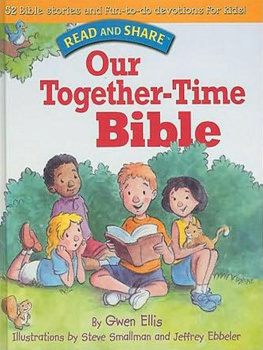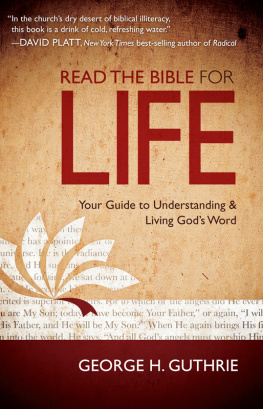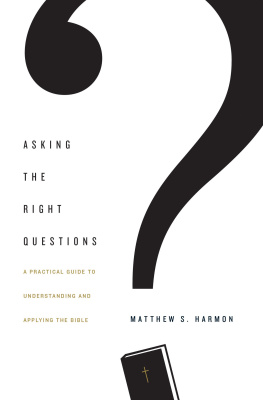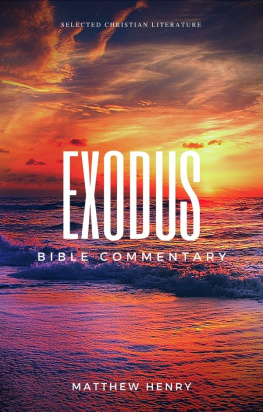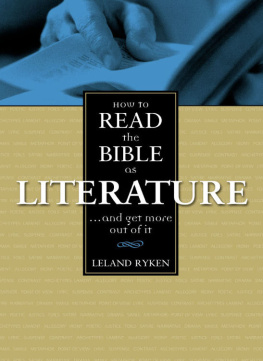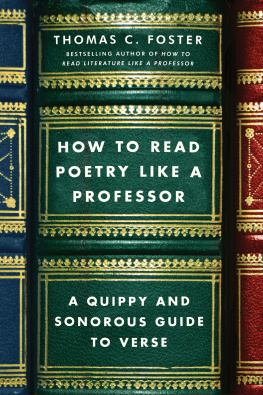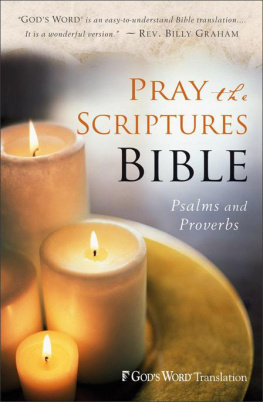Matthew Mullins - Enjoying the Bible: Literary Approaches to Loving the Scriptures
Here you can read online Matthew Mullins - Enjoying the Bible: Literary Approaches to Loving the Scriptures full text of the book (entire story) in english for free. Download pdf and epub, get meaning, cover and reviews about this ebook. year: 2021, publisher: Baker Publishing Group, genre: Religion. Description of the work, (preface) as well as reviews are available. Best literature library LitArk.com created for fans of good reading and offers a wide selection of genres:
Romance novel
Science fiction
Adventure
Detective
Science
History
Home and family
Prose
Art
Politics
Computer
Non-fiction
Religion
Business
Children
Humor
Choose a favorite category and find really read worthwhile books. Enjoy immersion in the world of imagination, feel the emotions of the characters or learn something new for yourself, make an fascinating discovery.
- Book:Enjoying the Bible: Literary Approaches to Loving the Scriptures
- Author:
- Publisher:Baker Publishing Group
- Genre:
- Year:2021
- Rating:3 / 5
- Favourites:Add to favourites
- Your mark:
- 60
- 1
- 2
- 3
- 4
- 5
Enjoying the Bible: Literary Approaches to Loving the Scriptures: summary, description and annotation
We offer to read an annotation, description, summary or preface (depends on what the author of the book "Enjoying the Bible: Literary Approaches to Loving the Scriptures" wrote himself). If you haven't found the necessary information about the book — write in the comments, we will try to find it.
Enjoying the Bible: Literary Approaches to Loving the Scriptures — read online for free the complete book (whole text) full work
Below is the text of the book, divided by pages. System saving the place of the last page read, allows you to conveniently read the book "Enjoying the Bible: Literary Approaches to Loving the Scriptures" online for free, without having to search again every time where you left off. Put a bookmark, and you can go to the page where you finished reading at any time.
Font size:
Interval:
Bookmark:
2021 by Matthew Mullins
Published by Baker Academic
a division of Baker Publishing Group
PO Box 6287, Grand Rapids, MI 49516-6287
www.bakeracademic.com
Ebook edition created 2021
All rights reserved. No part of this publication may be reproduced, stored in a retrieval system, or transmitted in any form or by any meansfor example, electronic, photocopy, recordingwithout the prior written permission of the publisher. The only exception is brief quotations in printed reviews.
Library of Congress Cataloging-in-Publication Data is on file at the Library of Congress, Washington, DC.
ISBN 978-1-4934-2195-4
Unless otherwise noted, Scripture quotations are from THE HOLY BIBLE, NEW INTERNATIONAL VERSION, NIV Copyright 1973, 1978, 1984, 2011 by Biblica, Inc. Used by permission. All rights reserved worldwide.
Scripture quotations labeled KJV are from the King James Version of the Bible.
For Michael Travers and Tom Lisk
meliores doctores
Cover
Half Title Page
Title Page
Copyright Page
Dedication
Preface
Acknowledgments
Introduction: The Hatred of Poetry and Why It Matters
1. How Reading Literature Became a Quest for Meaning
2. The Bible Is Literature
3. Meaning Is More Than Message
4. Not Any thing
5. Reading with Our Guts
6. Delight and Instruction
7. Why We Worship
8. Changing Our Approach
9. How to ReadGeneral Sense
10. How to ReadCentral Emotion
11. How to ReadFormal Means
12. A Short Compendium of Forms
Conclusion: Negative Capability and Habituation
Afterword: Reading Aloud
Bibliography
Index
Back Cover
Throughout the year and a half or so in which I worked on this book in earnest, friends, colleagues, and students who knew I was writing about the Bible and poetry would frequently ask me a question that went something like this: So, hows the Psalms book coming? The first few times, I tried to explain that it wasnt really a book about the Psalms but a book about how the Psalms remind us that understanding the Bible requires more than one kind of reading. Eventually, I gave up on reframing the question and would simply offer an update on my progress. I begin with this anecdote to dispel any notion readers may have that this is a book about the Psalms. While I will spend a good bit of time referencing and analyzing various psalms, my interest in poetry here is not merely an interest in the actual poems found in the Bible. In short, this book is about the pleasure of understanding. By that I mean two things. First, I mean that understanding what we read can be pleasurable. But second, I mean that, sometimes, you must take pleasure in something in order to understand it .
I said that I worked on the book in earnest for about a year and a half, but Ive been writing it in my head, in my class lectures, and in my conversations with students and colleagues for at least half a dozen years. I teach at a confessional liberal arts college housed at a Southern Baptist seminary. Many of my students have been reading, studying, even teaching the Bible from a young age. They have listened to countless sermons and devotions. Most can probably recite the names of the books of the Bible in canonical order and can quote many individual verses from memory. My students, in other words, are not typically novice Bible readers. And yet, when they show up in my survey of American literature and pick up their first poems by Anne Bradstreet or Phillis Wheatley, I hear the same protestations year after year:
Why doesnt the author just come right out and say what she means?
Whats she really trying to say?
It seems like shes making it difficult to understand on purpose.
If thats what the poems about, then why isnt that idea in the title?
Okay, okay, but whats the point?
My students, like most people, expect poetry to function like explanatory prose, perhaps because both take the form of printed words on paper. The problem is that poetry is not usually trying to explain an idea. It has a different purpose, which is why the writer chose to write a poem rather than a sermon, speech, or research essay.
The longer Ive taught poetry in this Christian context, the more Ive become aware of how rare it is to have a student who truly enjoys poems, and rarer still that I encounter a student who knows how to read them well. And then one day it dawned on me that if most of my students, self-proclaimed lovers of the Bible, do not know what to do with poems, then it would follow that most of them would not know what to do with a significant portion of the Scriptures. And yet, they did not seem to struggle with the Bible in the same way they struggled with the poetry in my literature classes. To me, this was dissonant, or, as I more likely thought of it, weird. If you had no problem reading John Winthrops sermon A Model of Christian Charity but couldnt feel the vulnerability in Bradstreets poem The Author to Her Book, it was evident to me that you were equipped to read the sermon but not the poem. If that was the case, then why wouldnt you experience the same disconnect when going from Pauls Letter to the Ephesians to Davids psalms of lament? There were two possible answers: either students were struggling to apply principles of reading biblical poetry to nonbiblical poems, or they were not reading the poetry of the Bible as poetry. For a number of reasons, I concluded the second was the more likely answer.
When reading the Bible, my students approached everything in the book as if it were explanatory prose. They would ask the same questions of Psalm 23 as they would of Ephesians 1. They would look for the main idea and try to draw an application for their own lives out of that main idea. Of course, they didnt come up with this approach or with this idea of what the Bible is on their own. They were taught this way of reading implicitly and explicitly over the course of their lives. I slowly began to realize just how thoroughly most Christians thought of the Bible itself as an instruction manual and of reading it as a process of looking for instruction or information. This revelation was personal as well. I recognized a deep divide in my own reading life between the works of literature I spend so much time with and the Bible. The problem with this dissonance is that the Bible is not only an instruction manual. It is so much more. Thus, to read it always for information is to miss out on the other forms of meaning it has for us, most especially the kind of relationship with God it seeks to foster.
The basic argument of this book is that much of the Bible is written to be enjoyed. The implication is that if reading the Bible does not enact pleasure in you, then you may not understand what you have read. By understand here I dont mean that you simply realize you should be comforted as a result of reading Psalm 23. I mean that the act of reading Psalm 23 should literally make you feel comforted. The Bible is our most direct access to Gods wordsit was written not only to convey information about him but also to provide a way for us to commune with him, to meet him in his Word. But in a world that largely separates information from enjoyment, weve come to experience the Bible primarily as a textbook or handbook, missing out on many of its more pleasurable aspects. The result is that we dont always love it like we could, or through it love God as we should.
Therefore, this book has two purposes. First, it seeks to change the way we think about the Bible itself as a text, to expand our sense of it from instruction manual to work of literary art. Second, it attempts to teach us how to read the Bible as a work of literary art. These purposes presuppose a radical assumption: that understanding what we read is not merely an intellectual exercise, and so we need more than our brains to understand the Bible. Because of their appeal to our emotions and imaginations, works of literature offer excellent models of texts that require a more comprehensive mode of reading. So the argument and purposes of the book come together in its method, which is to teach us how to think about and read literature in an effort to revolutionize our reading of the Bible. In other words, if you can learn how to enjoy a poem by Robert Frost, youre more likely to enjoy the Scriptures. And my prayer is that if you can learn to enjoy the Scriptures, then you will come to love them like you love other things: good food, your favorite film, a binge-worthy show. Just imagine if you delighted in the Bible like you delight in those things...
Font size:
Interval:
Bookmark:
Similar books «Enjoying the Bible: Literary Approaches to Loving the Scriptures»
Look at similar books to Enjoying the Bible: Literary Approaches to Loving the Scriptures. We have selected literature similar in name and meaning in the hope of providing readers with more options to find new, interesting, not yet read works.
Discussion, reviews of the book Enjoying the Bible: Literary Approaches to Loving the Scriptures and just readers' own opinions. Leave your comments, write what you think about the work, its meaning or the main characters. Specify what exactly you liked and what you didn't like, and why you think so.

